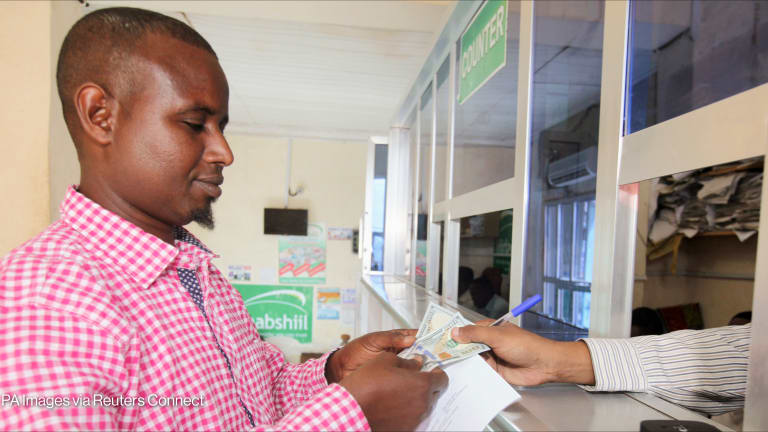
African NGOs are being underfunded by African and non-African philanthropists alike in comparison to organizations headquartered outside the continent, according to a recent report from the African Philanthropy Forum and The Bridgespan Group.
The research, which delves into the driving factors behind funding disparities for African NGOs, found that African funders directed just 9% of large gifts to NGOs based on the continent between 2010 and 2019, while non-African funders provided just 14% to these groups. Those numbers remained virtually unchanged despite a “massive” response from African funders to the COVID-19 pandemic in 2020, according to the report.
“The commonality across all of it is that relatively little ... ended up with African-led NGOs,” Bridgespan’s Jan Schwier, one of the authors of the report, told Devex. That held true no matter what year or context was examined, he added.
African philanthropists are directing more money toward their own private operating foundations instead of local NGOs, according to the report. These funders gave 33% of large gifts to operating foundations, examples of which include the Africa-based Mo Ibrahim Foundation and The Tony Elumelu Foundation.
Operating foundations mostly oversee their own philanthropic activities instead of directing grants to other organizations. This structure allows philanthropists to keep a close eye on how their money is being spent, and their use often reflects “a belief in the abilities and business backgrounds of the wealthy funders behind the operating foundation” rather than a lack of faith in African NGOs, according to the report. It adds that some people who were interviewed for the report said there is a “pervasive lack of trust in African NGOs” among African funders.
A goal of the report is to show African philanthropists that local NGOs have more knowledge about and credibility with the communities they want to reach and may therefore be better situated to help those populations, said Mosun Layode, executive director at the African Philanthropy Forum, which represents African philanthropists and social investors. Proponents of localization in development have spent years arguing essentially that same point.
“I would say that the operating foundations may not make as much impact,” Layode said. “They won’t have as much leverage in those communities. It’s going to take them time to build the credibility and access and connections that the NGOs already have.”
The research shows that without much funding flowing from African philanthropies, NGOs on the continent have been forced to look elsewhere. But non-African funders have similarly shown a reluctance to give to these groups. Instead, the majority of their large gifts have gone to international organizations headquartered outside of the continent, according to the report. International organizations may be less likely to have representatives from local communities among their leadership.
Also, when non-African funders do give, they exert a strong influence on how African NGOs operate, Schwier said. He questioned whether that was healthy for the sector in the long term.
“Is there not impact left on the table if we cannot get more African funders to contribute their knowledge, their ideas, their connection to what’s important for the continent by also more strongly supporting NGOs?” he asked.
The data shows that when African NGOs do receive grants, they often are small, short-term, and restricted. Very few funders provide African NGOs with multiyear grants that allow for more stability, Layode said.
Other barriers preventing African nonprofits from receiving philanthropic funding include a lack of targeted strategies within philanthropies to identify such groups, as well as the use of exclusionary “Western-centric” grant-making criteria that favor larger organizations over community-based ones, according to the report.
The findings come amid increased wealth accumulation and private philanthropic giving In Africa, the authors said. “This creates more opportunities for regional philanthropists to fund nonprofit organisations, and a greater need for a strong ecosystem to make it easier for nonprofits to tap into regional funding flows,” they said.
They also said the prominence of the Black Lives Matter movement and increased focus on racial justice globally have created a “reckoning in the international philanthropy space” that has highlighted the need for more locally led solutions. The effects of the pandemic — and the inequities it exposed — across and within countries further demonstrate the importance of community-based organizations, they said.
“Is there not impact left on the table if we cannot get more African funders to contribute ... their connection to what’s important for the continent by also more strongly supporting NGOs?”
— Jan Schwier, co-author of “Disparities in Funding for African NGOs” report“As I think about the utility of this report, hopefully it’s being able to do a bit of experience-sharing either through the report itself or in follow-up conversations,” said Maddie Holland, another author from Bridgespan.
The report is the second collaboration between Bridgespan and African Philanthropy Forum. Based in the U.S., The Bridgespan Group opened its first African office in Johannesburg in 2019 with the goal of boosting African-led development.
The two groups said they teamed up to research African philanthropy in 2020 “with the goal to support both African and international philanthropic donors in identifying ways to increase funding for African organisations and leaders.” This latest report builds on previously published research from the collaboration that tracked large-scale giving by African philanthropists in 2020.








